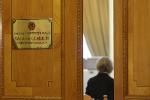Companies and people alike will stand to suffer and unemployment will rise even further as a result of NBR's decision to halt the reduction of the key rate, because this way loans will no longer get cheaper, and the final impact will be a slowdown of the economy over the span of several quarters, ING Bank Romania says.
At the same time, a banker that spoke under condition of anonymity says he is "very confused" by "NBR's disproportionately restrictive" policy for an economy in recession.
"One year from the onset of the crisis you keep an additional cost (via minimum mandatory reserves i.e.) of 1.5%. The problem is that we would stimulate domestic demand? We are afraid of a 0.5% added to inflation and we are not looking at unemployment? I am very confused." He believes that with this approach, the NBR is only driving clients to loans in foreign currency, which remain much cheaper.
"This decision will lead to a rise in interests on the interbank market, especially of the long-term rates, which were taking into account a relaxation of the monetary policy - which means interests on loans for clients will no longer go down and that will slow down the economy for several quarters if high interests remain in place. Therefore, companies and people alike will stand to suffer, and unemployment will increase more than anticipated," says Nicolaie Alexandru-Chidesciuc, ING Bank's chief economist. He explains that the NBR maintains a restrictive monetary policy, although Romania is experiencing a much more profound decline compared with other countries in the region which have a flexible exchange rate system in place.
Radu Ghetea, CEC Bank and Romanian Banking Association chairman says that interests on deposits in RON should remain in the one-digit bracket, so as to avoid making loans more expensive.
"I still believe that interest on deposits n




